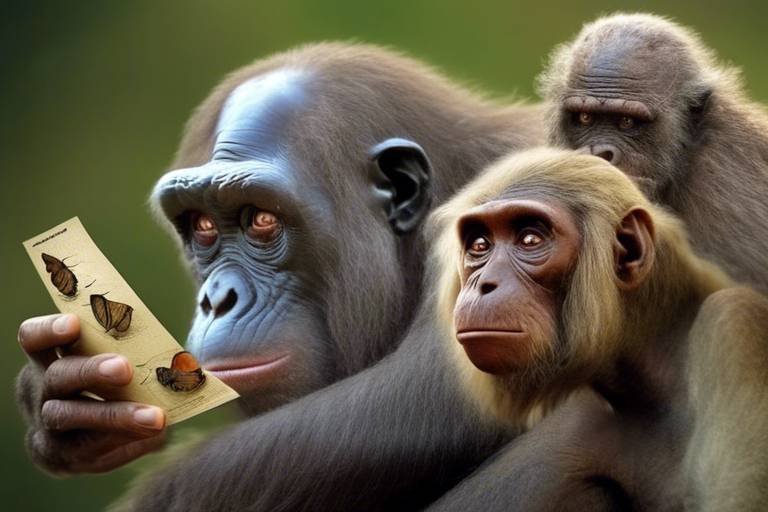Recent Discoveries in Genetics and Ancestry
The world of genetics and ancestry research has undergone a remarkable transformation in recent years, revealing fascinating insights into our past, health, and identity. Imagine being able to trace your lineage back hundreds, if not thousands, of years, all thanks to groundbreaking scientific advancements. These discoveries are not just about understanding where we come from; they are about unlocking the secrets of our DNA and how it shapes our lives today. With each new finding, we get closer to answering the age-old question: "Who are we?" This article delves into the latest breakthroughs in genetics and ancestry, exploring their implications and how they are reshaping our understanding of humanity.
Launched in 1990, the Human Genome Project aimed to map the entire human genome, consisting of approximately 3 billion DNA base pairs. By its completion in 2003, this monumental project had not only sequenced the human genome but also opened the floodgates for a new era in genetics. With the complete genetic blueprint at our fingertips, researchers can now identify genes linked to various diseases, understand genetic variations among populations, and even trace ancestral lineages with pinpoint accuracy. The implications are vast, ranging from personalized medicine to enhanced understanding of human evolution.
One of the most exciting advancements in genetics is the development of CRISPR technology. This revolutionary tool allows scientists to edit genes with unprecedented precision. Imagine being able to cut out a faulty gene and replace it with a healthy one, much like editing a text document. The potential applications in medicine are staggering, from correcting genetic disorders to potentially eradicating inherited diseases altogether. However, with great power comes great responsibility. The ethical considerations surrounding CRISPR's use in ancestry research are profound. For instance, how do we ensure that this technology is used responsibly and does not lead to genetic discrimination?
Recent advancements in gene therapy have shown promise in treating a variety of genetic disorders. By delivering healthy copies of genes to replace defective ones, gene therapy is reshaping the landscape of medical treatment. For instance, conditions like cystic fibrosis, hemophilia, and certain types of muscular dystrophy are now being targeted with innovative therapies that offer hope where there was once little. These developments not only provide new treatment options but also highlight the intricate relationship between our genes and our ancestry. Understanding the genetic basis of these disorders can illuminate the pathways through which they are inherited.
Several case studies have emerged that showcase the effectiveness of gene therapy. For example, a recent trial involving patients with spinal muscular atrophy demonstrated significant improvements in motor function after receiving gene therapy. Such success stories not only bring hope to patients and their families but also underscore the importance of understanding one's genetic background in tailoring effective treatments. The implications for ancestry are profound; as we learn more about how specific genes are passed down through generations, we can better comprehend the risks associated with inherited conditions.
Despite the promise of gene therapy, ethical dilemmas abound. Questions regarding consent, accessibility, and the potential for genetic discrimination loom large. As we venture into a future where gene editing becomes commonplace, we must grapple with the moral implications of altering our genetic makeup. Will individuals with certain genetic traits be marginalized? How do we ensure that everyone has equal access to these groundbreaking treatments? These questions are vital as we navigate the intersection of genetics and ancestry.
The rise of DNA ancestry testing has captivated the public's imagination. Companies like 23andMe and AncestryDNA have made it possible for individuals to uncover their heritage with just a simple saliva sample. The methodologies employed in these tests can reveal a wealth of information about one's lineage, including ethnic backgrounds and potential health risks. However, this newfound access to personal genetic information also raises concerns about privacy and the ethical use of genetic data. As we embark on this journey of self-discovery, it's essential to consider the implications of what we learn.
Population genetics is another burgeoning field that has shed light on human migration patterns and ancestry. By studying genetic markers across different populations, researchers can trace the movements of our ancestors across the globe. This research not only enhances our understanding of human history but also highlights the interconnectedness of all people. For instance, findings have shown that genetic diversity is crucial for the health of populations, emphasizing the importance of preserving diverse genetic pools.
There is a significant relationship between genetic diversity and health outcomes. Populations with greater genetic variation tend to exhibit better resilience against diseases. Understanding one’s ancestry can provide insights into potential health risks and inform personalized medicine approaches. As we embrace the future of healthcare, recognizing the role of ancestry in our genetic makeup will be crucial in developing targeted treatments that are effective and safe.
Looking ahead, the future of genetics and ancestry research is brimming with possibilities. We can expect breakthroughs in gene editing, enhanced DNA testing technologies, and a deeper understanding of the human genome. As we continue to unravel the mysteries of our genetic heritage, the implications for society and individual identity will be profound. Will we redefine what it means to belong? How will our understanding of ancestry shape our views on race and identity? These questions will be at the forefront of genetic research in the coming years.
- What is the Human Genome Project? The Human Genome Project was an international research initiative aimed at mapping the entire human genome, completed in 2003.
- How does CRISPR technology work? CRISPR technology allows scientists to edit genes by cutting DNA at specific locations, enabling the addition or removal of genetic material.
- What are the ethical concerns surrounding gene therapy? Ethical concerns include issues of consent, accessibility, and the potential for genetic discrimination.
- How accurate are DNA ancestry tests? DNA ancestry tests can provide insights into ethnic backgrounds and lineage, but results may vary based on the database and methodology used.
- What is population genetics? Population genetics studies the genetic composition of populations and how it changes over time, helping to trace human migration patterns.

The Human Genome Project
The Human Genome Project (HGP) stands as a monumental achievement in the field of genetics, marking a pivotal moment in our quest to understand the very essence of what makes us human. Launched in 1990 and completed in 2003, this international scientific research project aimed to map all the genes in the human genome, which consists of approximately 3 billion DNA base pairs. Imagine trying to read a book that's over a billion pages long; that's essentially what scientists set out to do with our genetic code!
One of the primary objectives of the HGP was to identify the estimated 20,000-25,000 genes in human DNA and determine the sequences of the 3 billion chemical base pairs that make up human DNA. This groundbreaking project was not just about mapping genes; it was about unlocking the secrets of our biology, improving health outcomes, and enhancing our understanding of human evolution and ancestry. The implications of this project are vast, ranging from advancements in medicine to insights into human history.
With the completion of the HGP, researchers gained access to a treasure trove of genetic information. This data has led to significant advancements in various fields, including personalized medicine, where treatments can be tailored to an individual's genetic makeup. Additionally, the project has paved the way for further studies in genetics, allowing scientists to explore complex diseases like cancer, diabetes, and heart disease at a molecular level.
Moreover, the HGP has transformed our understanding of ancestry. By comparing genetic sequences, researchers can trace lineage and migration patterns, revealing how our ancestors populated the globe. For instance, genetic markers can illuminate connections between different populations, showing how we are all part of a vast tapestry of human history. This aspect of the project has sparked a surge in interest in DNA ancestry testing, allowing individuals to explore their roots and understand their heritage in ways that were previously unimaginable.
As we delve deeper into the findings of the HGP, it becomes clear that the knowledge gained is not just academic; it touches on personal identity and cultural heritage. The ability to pinpoint genetic predispositions to certain traits or diseases raises questions about how we view ourselves and our families. It’s a bit like holding a mirror to our past, reflecting not just who we are but where we come from.
In summary, the Human Genome Project has revolutionized our understanding of genetics and ancestry. Its completion has opened up a world of possibilities, allowing us to explore the intricate connections between our genes, our health, and our history. As we continue to analyze the wealth of data generated by this project, the future of genetics looks brighter than ever, promising new insights into the very fabric of human life.

CRISPR Technology
CRISPR technology, often dubbed a revolutionary tool in the field of genetics, has dramatically changed the landscape of genetic editing. Imagine being able to edit the very fabric of life itself, much like correcting a typo in a book. This is precisely what CRISPR allows scientists to do—target specific sequences of DNA and modify them with unprecedented precision. The implications of this technology extend far beyond mere curiosity; they touch on critical areas such as medicine, agriculture, and even ancestry research.
At its core, CRISPR stands for Clustered Regularly Interspaced Short Palindromic Repeats. It is a natural defense mechanism found in bacteria that has been adapted for use in genetic engineering. By utilizing an enzyme called Cas9, scientists can cut DNA at specific sites, allowing for the addition or deletion of genetic material. This process is akin to using a pair of scissors to cut out a section of a document and replacing it with new information. The precision and efficiency of CRISPR make it a game-changer in various fields.
In the realm of medicine, CRISPR holds the promise of treating genetic disorders that have long been deemed untouchable. Imagine a world where conditions like sickle cell anemia or cystic fibrosis could be corrected at the genetic level. This technology opens the door to potential cures rather than just treatments, offering hope to millions of individuals and families affected by genetic diseases. However, with great power comes great responsibility. The ethical implications of editing human DNA are profound and cannot be overlooked.
When discussing CRISPR's applications in ancestry research, it is essential to consider how this technology can enhance our understanding of genetic heritage. By identifying and modifying genetic markers associated with specific traits or ancestries, researchers can provide individuals with deeper insights into their lineage. However, this raises important ethical questions: How far should we go in altering our genetic makeup? What are the potential consequences of creating "designer" genes?
To navigate these waters, it is crucial to establish guidelines and regulations that govern the use of CRISPR technology. A balance must be struck between innovation and ethical responsibility. As we delve deeper into this fascinating field, the need for public discourse and regulatory frameworks becomes increasingly important.
In summary, CRISPR technology is a powerful tool that has the potential to reshape our understanding of genetics and ancestry. While its applications in medicine and research are promising, the ethical dilemmas it presents must be carefully considered. As we stand on the brink of a new era in genetic science, the conversations we have today will shape the future of humanity.
- What is CRISPR technology? CRISPR is a genetic editing tool that allows scientists to modify DNA with precision.
- How does CRISPR work? It uses an enzyme called Cas9 to cut DNA at specific sites, enabling the addition or deletion of genetic material.
- What are the ethical concerns surrounding CRISPR? Ethical concerns include the potential for genetic discrimination and the implications of creating genetically modified humans.
- Can CRISPR be used for ancestry research? Yes, CRISPR can help identify and modify genetic markers, providing insights into an individual's lineage.
- What are the potential medical applications of CRISPR? CRISPR has the potential to treat genetic disorders, offering hope for cures rather than just treatments.

Gene Therapy Advances
Gene therapy has emerged as a revolutionary approach in the field of medicine, offering new hope for individuals suffering from genetic disorders. Imagine being able to correct a faulty gene that has been the cause of a debilitating illness. That's precisely what gene therapy aims to achieve. With advancements in technology and a deeper understanding of genetics, researchers are making significant strides in developing effective treatments. This new frontier is not just about treating symptoms; it’s about addressing the root cause of diseases.
One of the most exciting aspects of gene therapy is its potential to treat a wide range of conditions. From rare genetic disorders like cystic fibrosis and hemophilia to more common diseases such as diabetes and certain types of cancer, gene therapy is paving the way for innovative treatment options. For instance, scientists have been able to successfully use viral vectors to deliver healthy copies of genes to patients, effectively restoring normal function at the cellular level. This is akin to replacing a broken part in a machine; when the part is fixed, the entire system can function smoothly again.
Recent clinical trials have showcased the effectiveness of gene therapy in treating inherited conditions. For example, in a landmark study, researchers developed a gene therapy for spinal muscular atrophy (SMA), a severe genetic disorder that affects motor neurons. The results were astounding, with many patients showing significant improvements in muscle strength and mobility. This case exemplifies how gene therapy can not only enhance the quality of life but also extend it for individuals who previously had limited options.
However, as with any groundbreaking technology, there are ethical dilemmas that must be considered. Gene therapy raises questions about accessibility, equity, and the potential for genetic discrimination. For instance, who gets access to these advanced treatments? Will they be available only to those who can afford them? This is a crucial conversation that needs to happen as we move forward with these technologies. The implications of gene therapy extend beyond individual health; they touch on societal values and the very fabric of our understanding of identity and ancestry.
In summary, the advances in gene therapy represent a monumental leap forward in medicine. By correcting genetic defects at their source, we are not just treating diseases but also reshaping the future of healthcare. As research continues to unfold, the potential for gene therapy to transform our understanding of health and ancestry is immense. It encourages us to think about our genetic legacy and how it can be altered for future generations.
- What is gene therapy? Gene therapy is a technique that modifies a person's genes to treat or prevent disease.
- How does gene therapy work? It works by delivering healthy copies of genes to replace defective ones or by repairing malfunctioning genes.
- What conditions can gene therapy treat? Gene therapy has the potential to treat various genetic disorders, including cystic fibrosis, hemophilia, and spinal muscular atrophy.
- Are there any risks associated with gene therapy? Yes, there can be risks, including immune reactions and the potential for unintended effects on other genes.
- Is gene therapy available to the public? Some forms of gene therapy are currently available, but many are still in clinical trials.

Case Studies in Gene Therapy
Gene therapy has emerged as a revolutionary approach in the treatment of various genetic disorders, and its impact is best understood through real-world examples. One notable case is that of Luxturna, a gene therapy designed to treat inherited retinal disease caused by mutations in the RPE65 gene. This condition leads to severe vision loss and, in some cases, blindness. In clinical trials, patients who received Luxturna showed significant improvements in their ability to see in low-light conditions, demonstrating that targeted gene therapy can restore function at the cellular level. This case not only highlights the potential of gene therapy but also raises questions about accessibility and cost, as Luxturna is priced at around $850,000 for a one-time treatment.
Another compelling example is the case of Zolgensma, a gene therapy for spinal muscular atrophy (SMA), a severe genetic disorder affecting motor neurons. SMA can lead to muscle weakness and atrophy, severely impacting a child's ability to move. Zolgensma works by delivering a copy of the SMN gene, which is crucial for the survival of motor neurons. In clinical trials, children treated with Zolgensma exhibited significant motor function improvements compared to those who did not receive the therapy. This has transformed the outlook for many families, turning what was once a life-threatening condition into a manageable one.
These case studies exemplify the promise of gene therapy, but they also illuminate the complexities involved. For instance, while the success of Luxturna and Zolgensma is encouraging, they also highlight the ethical dilemmas surrounding gene therapy, especially regarding the distribution of such treatments. Who gets access? How do we ensure that these groundbreaking therapies are available to all, regardless of socioeconomic status? These questions are crucial as we navigate the future of gene therapy in the context of ancestry and genetic predispositions.
Moreover, the implications of these therapies extend beyond individual health. They challenge our understanding of genetic identity and ancestry. If a therapy can alter genetic expression, what does that mean for our concept of inherited traits? Will we redefine what it means to belong to a particular lineage? As we continue to explore these exciting developments, it’s essential to consider both the potential and the ethical ramifications of gene therapy.
- What is gene therapy? Gene therapy is a technique that modifies a person's genes to treat or prevent disease, often by replacing, inactivating, or introducing genes into cells.
- How does gene therapy work? It works by delivering therapeutic genes into a patient's cells, which can help correct genetic disorders or enhance the body's ability to fight diseases.
- What are the risks associated with gene therapy? Risks can include immune reactions, unintentional effects on other genes, and the possibility of the therapy not working as intended.
- Is gene therapy available for all genetic disorders? Currently, gene therapy is available for specific conditions, and ongoing research aims to expand its applications.

Ethical Dilemmas in Gene Therapy
As we delve deeper into the world of gene therapy, it's essential to recognize that with great power comes great responsibility. The ability to edit genes and potentially eliminate genetic disorders is nothing short of revolutionary, but it also raises a plethora of ethical dilemmas that we must confront. One of the most pressing issues is the concern over genetic discrimination. Imagine a world where employers or insurance companies could access your genetic information. What if they chose to deny you a job or coverage based on a predisposition to a certain condition? This scenario is not as far-fetched as it sounds, and it raises serious questions about privacy and the right to control one's genetic data.
Moreover, the potential for designer babies adds another layer of complexity. While the idea of selecting traits like intelligence or physical appearance may seem appealing, it opens the floodgates to a host of moral questions. Are we crossing a line by playing God? And who gets to decide which traits are desirable? The implications of such choices could lead to a society divided by genetic privilege, where only the wealthy can afford to enhance their offspring.
Another significant ethical dilemma is the issue of consent, especially when it comes to inherited conditions. For instance, if a child is treated with gene therapy, how can we ensure that they fully understand and agree to the treatment when they are too young to make such decisions? This brings us to the concept of informed consent, which is crucial in any medical procedure but becomes murky in the context of genetic editing.
Furthermore, we must consider the potential for unintended consequences. Gene editing is still a relatively new field, and while scientists are making remarkable strides, the long-term effects of altering genes are largely unknown. Could we inadvertently create new health issues or exacerbate existing ones? The precautionary principle suggests that we should proceed with caution, ensuring that the benefits outweigh the risks before moving forward.
To encapsulate these ethical dilemmas, let’s consider some key points:
- Genetic Discrimination: The risk of misuse of genetic information by employers and insurers.
- Designer Babies: The moral implications of selecting traits and the potential for societal division.
- Informed Consent: Challenges in ensuring that patients, especially minors, can give proper consent.
- Unintended Consequences: The unknown long-term effects of gene editing on future generations.
As we navigate these complex ethical waters, it’s crucial for scientists, ethicists, and society at large to engage in open dialogue. By addressing these dilemmas head-on, we can work towards a future where gene therapy is not only effective but also ethically sound. The path forward will require collaboration, transparency, and a commitment to ensuring that the benefits of these groundbreaking advancements are accessible to all, without compromising our moral compass.
Q1: What is gene therapy?
A: Gene therapy is a technique that modifies a person's genes to treat or prevent disease. It can involve replacing, inactivating, or introducing genes into the body.
Q2: What are the risks associated with gene therapy?
A: Risks may include immune reactions, unintended effects on other genes, and ethical concerns regarding consent and genetic discrimination.
Q3: How does gene therapy relate to ancestry research?
A: Gene therapy can help us understand inherited conditions and their prevalence in different populations, thus enhancing our understanding of human ancestry.
Q4: Are there regulations governing gene therapy?
A: Yes, many countries have strict regulations and ethical guidelines to ensure the safety and efficacy of gene therapy treatments.

DNA Ancestry Testing
In recent years, has taken the world by storm, transforming how we view our heritage and lineage. Imagine holding a small vial of your own genetic material and, with just a few drops of saliva, unlocking the secrets of your ancestry. It's like having a time machine in your pocket! These tests analyze your genetic makeup to provide insights into your ethnic background, familial connections, and even geographical origins. But how does this all work, and why has it become such a popular trend?
The process begins with a simple saliva sample, which is then sent to a laboratory for analysis. Here, scientists examine specific markers in your DNA that are known to correlate with various populations around the globe. These markers serve as breadcrumbs, leading researchers to trace your lineage back through time, revealing where your ancestors may have lived and migrated. The results can be astonishing, often uncovering connections to cultures and regions you may have never considered.
One of the most exciting aspects of DNA ancestry testing is its ability to connect individuals with long-lost relatives. Many testing companies offer features that allow users to find and communicate with genetic relatives who have also taken the test. This can lead to heartwarming reunions and the discovery of family stories that have been lost to time. It's like piecing together a family puzzle, where each new piece adds depth and richness to your understanding of who you are.
However, while the allure of uncovering your roots is undeniable, it's essential to approach DNA ancestry testing with a discerning eye. The results can sometimes be surprising, revealing unexpected ethnic backgrounds or family connections that challenge previously held beliefs. For instance, you might discover that you have a significant percentage of ancestry from a region you never thought you were connected to. This can be both exciting and disorienting, leading to questions about identity and belonging.
Moreover, the implications of DNA ancestry testing extend beyond personal curiosity. These tests can contribute to broader scientific research, helping to map out human migration patterns and genetic diversity across populations. By analyzing the results from thousands of individuals, researchers can gain insights into how humans have spread across the globe over millennia. This information is crucial for understanding not just our past, but also how it informs our present and future health.
As with any technology, there are ethical considerations to keep in mind. Privacy is a significant concern, as the data collected through these tests can be sensitive. Companies often have varying policies regarding how they handle and share genetic information, so it’s vital for consumers to read the fine print. Additionally, there are discussions about the potential for genetic discrimination, where individuals might be treated differently based on their genetic background. This raises important questions about how society will navigate these challenges as DNA testing becomes more mainstream.
In conclusion, DNA ancestry testing is not just a passing fad; it’s a fascinating intersection of science and personal exploration. It allows us to connect with our past while also shaping our understanding of who we are today. As technology continues to advance, the possibilities for what we can learn about ourselves and our lineage are boundless. So, if you’re curious about where you come from, taking a DNA ancestry test might just be the key to unlocking your family’s history.
- What is DNA ancestry testing? DNA ancestry testing involves analyzing your genetic material to provide insights into your ethnic background and family lineage.
- How accurate are the results? While DNA tests can provide valuable information, results may vary between companies due to different methodologies and databases.
- Can I find relatives through these tests? Yes! Many companies offer features that connect you with genetic relatives who have also taken the test.
- What are the privacy concerns? Privacy is a significant issue; it's essential to understand how your data will be used and stored by the testing company.

Population Genetics
Population genetics is an exciting field that dives deep into the genetic composition of populations, examining how genes vary across different groups and what this means for our understanding of human history. Imagine each person as a unique puzzle piece, and when we look at the bigger picture, we can see how these pieces fit together to tell a fascinating story of migration, adaptation, and survival. Recent discoveries in this area have illuminated the paths our ancestors took across the globe, revealing intricate patterns of human migration that span thousands of years.
At its core, population genetics utilizes genetic markers—specific sequences in our DNA that can indicate particular traits or ancestry. By analyzing these markers, scientists can trace lineage and understand how certain genetic traits have been passed down through generations. For instance, the study of mitochondrial DNA, which is inherited solely from the mother, provides insights into maternal lineage and can help trace back to a common ancestor shared by all humans. This is akin to following a thread through a vast tapestry, where each stitch represents a connection to our forebears.
One of the most fascinating aspects of population genetics is how it can help us understand the relationship between genetics and health. For example, certain populations may carry genetic predispositions to specific diseases, which can be traced back to their ancestry. This knowledge is crucial, especially in personalized medicine, where treatments can be tailored based on an individual's genetic background. By recognizing these patterns, healthcare providers can offer more effective interventions, reducing the risk of diseases that may disproportionately affect certain groups.
Moreover, the advancements in technology have made it easier than ever to conduct population genetics research. High-throughput sequencing and bioinformatics tools allow scientists to analyze vast amounts of genetic data quickly and accurately. This not only enhances our understanding of human diversity but also aids in the conservation of endangered species by understanding their genetic health and variability. It's like having a high-powered microscope that reveals the hidden intricacies of life itself.
As we explore the implications of population genetics, it's essential to acknowledge the ethical considerations that come into play. With the power to trace ancestry and identify genetic predispositions, we must tread carefully to avoid genetic discrimination. The potential for misuse of genetic information poses a significant risk, leading to concerns about privacy and the stigmatization of certain groups based on their genetic makeup. Thus, while the discoveries in population genetics are groundbreaking, they also necessitate a dialogue about the responsible use of such information.
In summary, population genetics is not just about understanding where we come from; it's about recognizing the profound connections that bind us all together. As we continue to unravel the complexities of our genetic heritage, we open doors to new discoveries that can enhance our understanding of health, identity, and the very fabric of humanity. The journey of understanding our genetic past is ongoing, and with each new finding, we are reminded of the shared story that connects us all.
- What is population genetics?
Population genetics studies the genetic composition of populations and how it changes over time due to various factors such as natural selection, mutation, and genetic drift.
- How does population genetics relate to ancestry?
It helps trace lineage and migration patterns of human populations, providing insights into ancestral connections and the genetic diversity within and between groups.
- Why is population genetics important for health?
Understanding genetic predispositions can lead to more effective personalized medicine and targeted treatments for diseases that may affect specific populations.
- What ethical considerations are involved in population genetics?
Concerns include genetic discrimination, privacy issues, and the potential misuse of genetic information, which necessitates careful handling of genetic data.

Genetic Diversity and Health
When we talk about genetic diversity, we're diving into a fascinating world that goes beyond mere numbers and statistics. It’s like looking at a vibrant tapestry where each thread represents a unique piece of our ancestry. This diversity is crucial for the survival and adaptability of species, including humans. But how does this genetic variation impact our health? Let’s unravel this intricate connection!
Research has shown that populations with greater genetic diversity tend to have better health outcomes. This is because a diverse gene pool can lead to a wider range of traits that enhance survival and resistance to diseases. For instance, individuals from genetically diverse backgrounds often have a better immune response, making them less susceptible to infections. Imagine a team of superheroes where each hero has different powers; together, they can tackle challenges that a single hero might struggle with. Similarly, genetic diversity equips populations with a robust arsenal against health threats.
One of the most striking examples of this phenomenon is the relationship between genetic diversity and conditions such as cardiovascular diseases and diabetes. Studies suggest that certain genetic variants can influence how our bodies respond to diet and exercise. For example, individuals with specific genetic markers may metabolize fats differently, which can affect their risk of developing heart disease. This is where understanding our ancestry becomes vital; it can provide insights into our predispositions, guiding us toward personalized health strategies.
Furthermore, genetic diversity plays a significant role in the effectiveness of medical treatments. Take cancer therapies, for instance. The genetic makeup of tumors can vary significantly between individuals. This variability means that a treatment that works wonders for one person may not have the same effect on another. By studying genetic diversity, researchers can develop more targeted therapies that consider a patient’s unique genetic profile, leading to improved outcomes. It’s like customizing a suit to fit perfectly rather than opting for a one-size-fits-all approach.
However, it’s important to recognize that while genetic diversity has its benefits, it also raises some ethical questions. For instance, how do we ensure that advancements in genetic research and personalized medicine are accessible to everyone, regardless of their genetic background? There’s a risk that communities with less genetic diversity could be overlooked in research, leading to health disparities. This is where the conversation about equity in healthcare becomes crucial. We must strive to ensure that all populations are represented in genetic studies to avoid creating a healthcare system that favors some while neglecting others.
In summary, the interplay between genetic diversity and health is a complex yet fascinating topic. It highlights the importance of understanding our roots not just for curiosity's sake but for practical health implications. As we continue to explore the human genome and its vast potential, we must also consider the ethical dimensions and strive for inclusivity in our research. After all, ensuring that everyone benefits from these advancements is as important as the discoveries themselves.
- What is genetic diversity? Genetic diversity refers to the variety of genes within a species. It is crucial for survival and adaptability to changing environments.
- How does genetic diversity affect health? Higher genetic diversity can lead to better health outcomes and resilience against diseases due to a wider range of beneficial traits.
- Why is understanding ancestry important for health? Understanding one’s ancestry can provide insights into genetic predispositions and help tailor personalized health strategies.
- What are the ethical concerns regarding genetic research? There are concerns about equity in healthcare, ensuring that all populations are represented in genetic studies to avoid health disparities.

Future Directions in Genetics
The future of genetics is a thrilling frontier, brimming with possibilities that could redefine our understanding of life itself. Imagine a world where genetic disorders are not just managed but completely eradicated. With advancements in technology, especially in areas like gene editing and synthetic biology, we are on the cusp of breakthroughs that could change the very fabric of our existence. But what does this mean for us as individuals and as a society?
One of the most exciting prospects lies in the realm of personalized medicine. As we continue to decode the human genome, the potential for tailored treatments that cater to our unique genetic makeup becomes increasingly viable. This means that instead of a one-size-fits-all approach, medical professionals could prescribe treatments based on our specific genetic profiles. Imagine getting a prescription that is designed specifically for your DNA—how cool is that?
Moreover, the integration of artificial intelligence (AI) in genetics is set to revolutionize the field. AI can analyze vast amounts of genetic data far quicker than any human could, identifying patterns and correlations that may have previously gone unnoticed. This could lead to the discovery of new genetic markers for diseases, enhancing our understanding of how genetics influences health and disease. In fact, AI has the potential to predict disease susceptibility and treatment responses, enabling proactive healthcare measures.
As we look ahead, we must also consider the ethical implications of these advancements. With great power comes great responsibility, and the ability to edit genes raises significant questions. How do we ensure that these technologies are used ethically? Will they be accessible to everyone, or will they create a divide between those who can afford genetic enhancements and those who cannot? These are questions that society must grapple with as we forge ahead into this new era of genetics.
Furthermore, the exploration of epigenetics—the study of how environmental factors influence gene expression—opens up new avenues for research. This could lead to groundbreaking insights into how lifestyle choices affect our health across generations. For instance, understanding the epigenetic changes caused by diet, stress, and environment could empower individuals to make informed decisions that promote better health for themselves and their descendants.
Lastly, the field of population genetics continues to evolve, shedding light on human migration patterns and ancestral connections. With the advent of advanced genomic sequencing technologies, researchers can now trace lineage and migration with unprecedented accuracy. This not only enriches our understanding of human history but also strengthens our connection to our roots, providing a deeper sense of identity.
In conclusion, the future directions in genetics are both exhilarating and complex. As we stand on the brink of these remarkable advancements, it is crucial to approach them with curiosity and caution. The potential to transform health, enhance our understanding of ancestry, and even redefine what it means to be human is within our grasp. However, it is up to us to navigate this landscape responsibly, ensuring that the benefits of these innovations are shared equitably across society.
- What is personalized medicine? Personalized medicine is a medical model that tailors healthcare, with decisions and treatments customized to the individual patient based on their genetic makeup.
- How does AI contribute to genetics? AI analyzes large datasets quickly, identifying patterns that can lead to new discoveries in genetic research, disease susceptibility, and treatment responses.
- What are the ethical concerns surrounding gene editing? Ethical concerns include the potential for genetic discrimination, accessibility of treatments, and the implications of altering human DNA.
- What is epigenetics? Epigenetics studies how external factors influence gene expression without altering the DNA sequence itself, impacting health and development across generations.
- How can population genetics inform our understanding of human history? Population genetics uses genetic data to trace lineage and migration patterns, providing insights into how human populations have evolved and interacted over time.
Frequently Asked Questions
- What is the Human Genome Project and why is it important?
The Human Genome Project (HGP) is a groundbreaking initiative aimed at mapping the entire human genome. Completed in 2003, it has provided invaluable insights into our genetic makeup, helping us understand the genetic basis of diseases and ancestry. Imagine having a complete blueprint of a house; the HGP gives us a detailed map of our biological structure, which is crucial for advancements in medicine and genetics.
- How does CRISPR technology work in genetic editing?
CRISPR technology is like a pair of molecular scissors that allows scientists to cut and edit DNA at specific locations. This revolutionary tool enables precise modifications to genes, which can lead to potential cures for genetic disorders. Think of it as a spell-checker for DNA—correcting errors that could lead to diseases. However, it also raises ethical questions about its use in ancestry research.
- What are the latest advancements in gene therapy?
Recent advancements in gene therapy have opened new doors for treating genetic disorders. Techniques are evolving to deliver genes directly to affected cells, potentially curing conditions that were previously deemed untreatable. For example, some therapies have shown success in treating inherited blindness, highlighting how gene therapy can reshape our understanding of health and ancestry.
- Are there ethical concerns related to gene therapy?
Yes, ethical dilemmas abound in gene therapy, particularly regarding ancestry and genetic discrimination. Questions arise about who gets access to these treatments and how they might affect individuals based on their genetic background. It's crucial to navigate these waters carefully to ensure that advancements in genetics benefit everyone equally.
- What is DNA ancestry testing and how does it work?
DNA ancestry testing involves analyzing an individual's DNA to uncover their genetic heritage and lineage. By examining specific markers in the genome, these tests can reveal information about ancestral origins and migrations. It's like piecing together a family puzzle, helping people connect with their roots and understand their place in history.
- How does population genetics help us understand human migration?
Population genetics studies the distribution and changes of genetic variations within populations. Recent discoveries in this field have shed light on human migration patterns, showing how our ancestors moved across the globe. This research acts as a time machine, allowing us to trace our lineage and understand the interconnectedness of different populations.
- What is the relationship between genetic diversity and health?
Genetic diversity plays a critical role in health outcomes. A diverse gene pool can enhance resilience against diseases, while a lack of diversity may increase susceptibility to certain conditions. Understanding one's ancestry can provide insights into potential health risks, making personalized medicine more effective. It's like having a tailored suit that fits just right for your unique genetic makeup.
- What future trends can we expect in genetics and ancestry research?
The future of genetics and ancestry research is bright, with potential breakthroughs on the horizon. We may witness advancements in personalized medicine, improved gene editing techniques, and a deeper understanding of the human genome. As we continue to explore our genetic landscape, the implications for society and individual identity will be profound, creating a new chapter in the story of humanity.



















